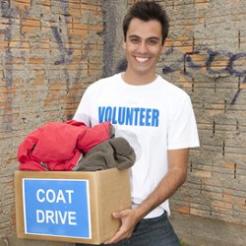The value of a charity is demonstrated at the very frontline with its volunteers, says David Philpott, as he marks the efforts of a stalwart member of the team.
It felt more like we were in rural Normandy than on a back road to Wootton Bassett, but SatNav never lies. Yeah right. "This restaurant reminds me so much of places I have eaten at in France," said Claire, corroborating my first impression - this as an extremely attentive waiter showed us to our seats.
It had been Frank’s idea to book a table at La Flambé. I would have been happy to eat at the Brewers Fayre just up the road from his secret office, but the man of the moment had decided that he wanted to show me a good time. "I think you ought to meet Frank," Claire had said a couple of weeks beforehand. "He has been volunteering for years and years and I know he would really appreciate meeting you."
We had taken a detour on the way to our little auberge and picked up Frank en-route (use of schoolboy French twice in one sentence unintended). "Frank has an office at Dorman House. He writes letters to parish councils and rotary clubs. Caroline has been to see him and he has an amazing database going back years," Claire had explained.
Now sitting opposite him, I was reminded yet again of why I so admire and respect charity volunteers. Smartly dressed – dapper even - one would never have guessed that Frank was 86 years old.
"So Frank, how long have you been volunteering for us?" I asked, desperately hoping I might be as compos mentis, well dressed and quick witted if and when I reach his age.
Picking up his glass and savouring the bouquet - and then the taste of his Merlot, he said in a matter-of-fact way, "I started in 1998. I’ve seen them all come and seen them all go."
I was reminded of Brian Hanrahan’s famous broadcast during the Falklands Conflict when he said “I'm not allowed to say how many planes joined the raid, but I counted them all out and I counted them all back.”
"Seen who come and go?" I asked struggling to follow his train of thought.
"Fundraisers," he replied with a hint of nostalgia in his twinkling eyes. "I was there when the charity employed the first one. That was Steve. Then there was Tracy, then Mel. They’ve all gone now, but I ‘m still around," he chortled. "But I shall have to pack it all in if I lose my office at Dorman House," he went on, in a tone that evidenced the certain inevitably of this happening at some point in the far distant future.
As I drove home later that day I did a lot of thinking about volunteer Frank, aged 86 and a half. I reflected on that famous quote by Gandhi about a nation's greatness being measured by how it treats its weakest members, and wondered if charities ought to be judged by how they treated their volunteers and not by their impacts, turnover or costs of generating funds.
‘Eccentric’, ‘dysfunctional’, ‘bossy’, ‘inadequate’, ‘sad and lonely’, they may sometimes be - and difficult to manage to boot - but a good group of volunteers are worth their weight in gold – not to mention a whole lot of fun too.
I have long cherished this notion that things usually start to go pear-shaped for a charity when it stops valuing its volunteers. This is just a pet theory of mine with no hard evidence to back it up. Lovely Frank demolishes my contention because he has just got on with it, unrecognised, and rarely thanked.
Frank Swan of Chippenham, volunteer extraordinaire; sir, I salute you!









